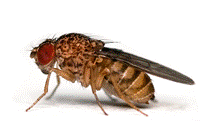Papers in the Biological Sciences

Lawrence G. Harshman Publications
Document Type
Article
Date of this Version
2004
Citation
Journal of Nutritional Biochemistry 15 (2004), pp. 591–600; doi:10.1016/j.jnutbio.2004.04.006
Abstract
Biotin deficiency is associated with fetal malformations and activation of cell survival pathways in mammals. In this study we determined whether biotin status affects life span, stress resistance, and fertility in the fruit fly Drosophila melanogaster. Male and female flies of the Canton-S strain had free access to diets containing 6.0 (control), 4.8, 2.5, or 0 pmol biotin/100 mg. Biotin concentrations in diets correlated with activities of biotin-dependent propionyl-CoA carboxylase and biotin concentrations in fly homogenates, but not with biotinylation of histones (DNA-binding proteins). Propionyl-CoA carboxylase activities and biotin concentrations were lower in males than in females fed diets low in biotin. The life span of biotin-deficient males and females was up to 30% shorter compared to biotin-sufficient controls. Exposure to oxidative stress reversed the effects of biotin status on survival in male flies: survival times increased by 40% in biotin-deficient males compared to biotin-sufficient controls. Biotin status did not affect survival of females exposed to oxidative stress. Exposure of flies to cold, heat, and oxidative stress was associated with mobilization of biotin from yet unknown sources. Biotin deficiency decreased fertility of flies. When biotin-deficient males and females were mated, the hatching rate (larvae hatched per egg) decreased by about 28% compared to biotin-sufficient controls. These findings are consistent with the hypothesis that biotin affects life span, stress resistance, and fertility in fruit flies.


Comments
© 2004 Elsevier Inc. Used by permission.